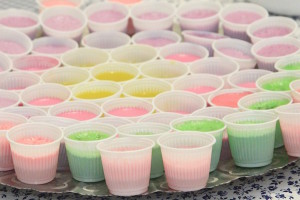A lot of noise has been happening on the social media scene with regards to gelatine and it’s origins thanks to a video posted by Over Eten. The video depicts a series of images of graphical, confronting and factual images that show how gelatine is sourced and created. You can check the video out here but just a note of warning – it is not for the faint hearted!
For those who do not wish to watch the video or for those who just want to learn more about gelatine, we’re going to dedicated this post to what it is, how is it created and what is it used for including a list of common food items where gelatine is added so you know some common items to watch out for.

What is Gelatine?
Gelatine is an odourless, tasteless food additive that is used as a setting agent. It is added into a variety of different foods and common everyday products, both fresh and processed, to form a firm, gel like consistency. It can also be obtained dehydrated as power or sheets.
How is Gelatine Made?
Generally obtained from pigs or cows, gelatine is created by boiling animal skin, tendons, ligaments and bones. It is then filtered and pressed into sheets or ground into a powder. Since it is odourless and tasteless, additives are then added as required for its application such as sweeteners or flavouring. You can read more about the gelatine process here.


What is Gelatine Used For?
Due to its setting properties, gelatine is used in a variety of products ranging from medication to food and cosmetics.
What To Look Out For
Commonly, look out for products that display a gel-like but firm consistency, such as gummy lollies, jelly, skincare creams and gels. Also look out for food additive E160a, where some manufacturers actually use gelatine in this additive. And, of course, the best way to avoid gelatine is to ask the manufacturer directly or speak to the person preparing your food. As an alternative, look for food containing agar instead, a gelatine alternative derived from seaweed rather than animal bones and skin and always shop for cosmetics that are gelatine free.
Have you found gelatine somewhere surprising? What did you think of the video by Over Eten? Tell us about it in the comments below!







Leave a Reply